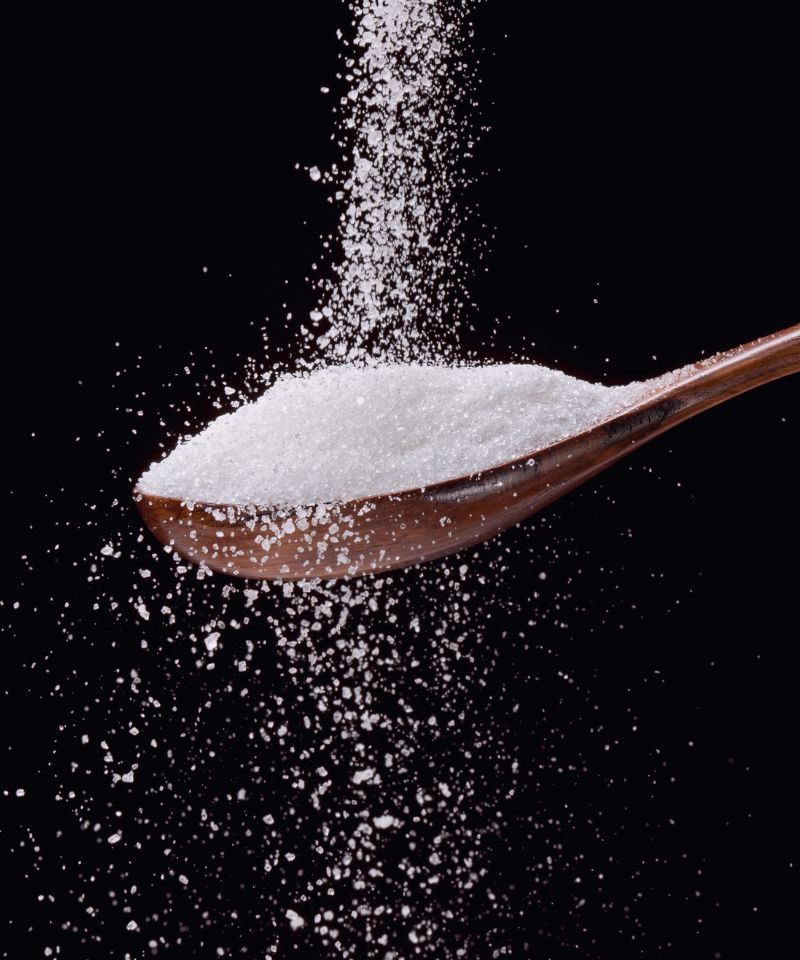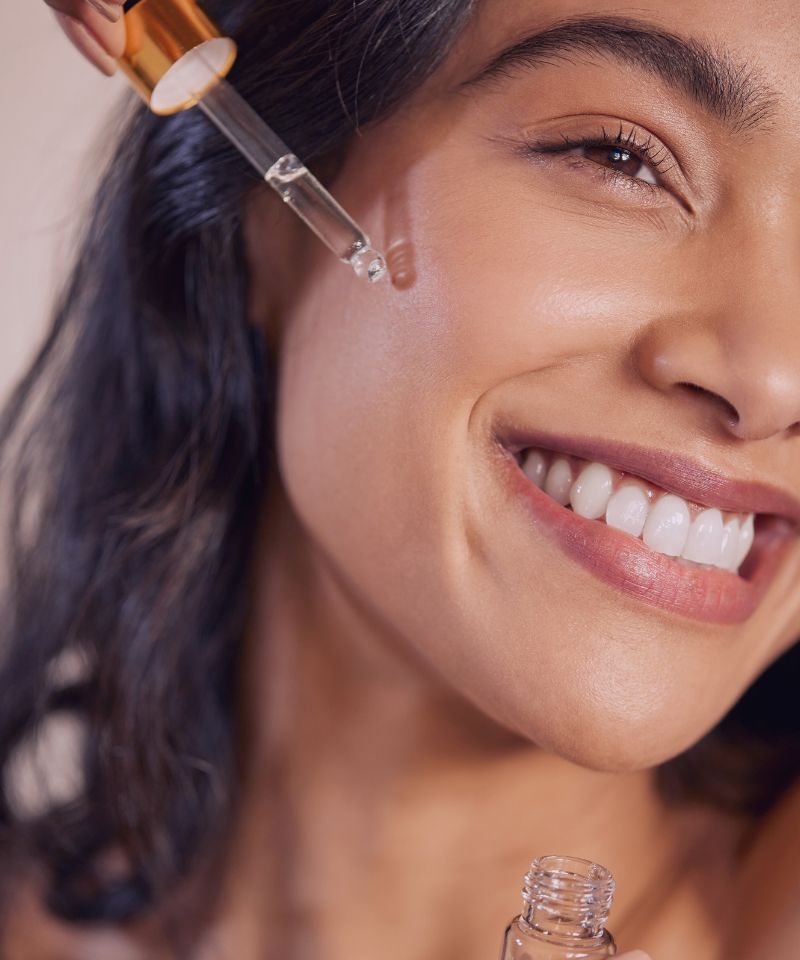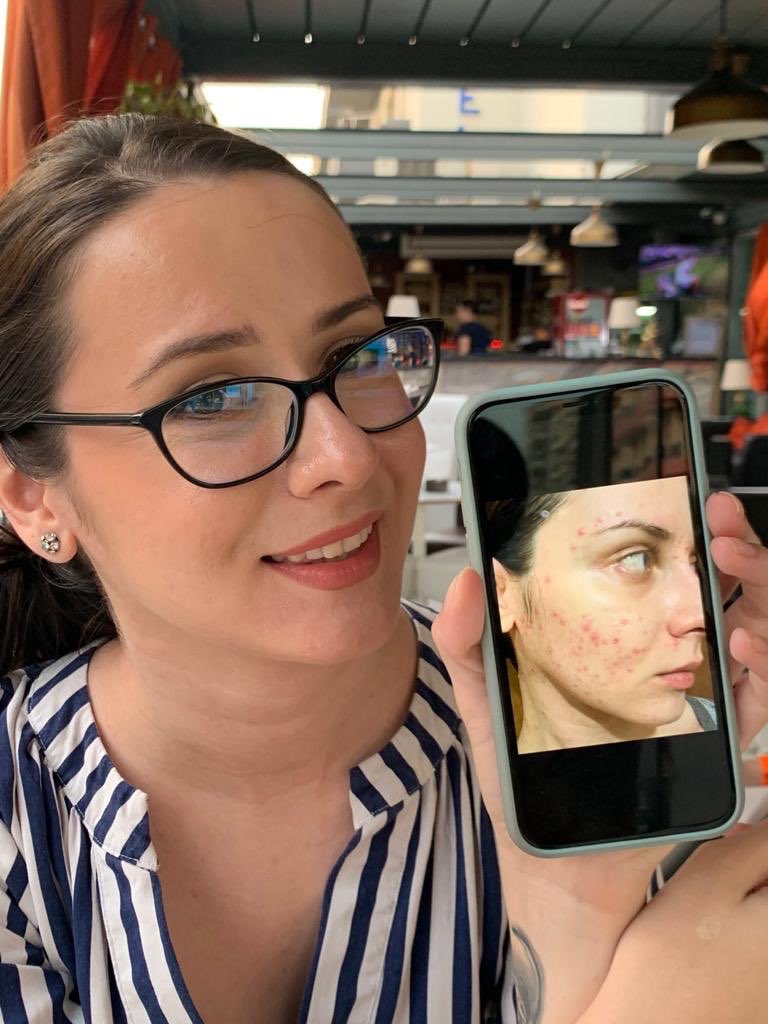From an irresistible bar of chocolate to your favorite soda, it’s hard to escape the sweet sugar trap in our modern diets.
Now, we all know that too much sugar isn’t good for our health and can lead to serious problems like diabetes and high blood pressure.
However, did you know that sugar may also be the culprit behind your pimples and those lines you didn’t expect to start showing up for at least another decade?
Your diet, and especially sugar consumption, plays a significant part in the overall health of your skin and can cause a variety of issues if you indulge in it too heavily.
Therefore, in this article, I will talk about the effects of sugar on your skin, how to mitigate them and ensure your skin stays healthy and looks plump and glowy for years to come.
Besides being one of the main factors that can contribute to diabetes, cardiovascular, liver, and kidney disease, here are six most common effects of sugar on the skin:
- Inflammation.
- Increased Oil Production.
- Acne.
- Aging.
- Aggravated Skin Conditions.
- Hormonal Imbalances.

How Does Sugar Affect the Skin?

When you consume sugar, your body goes through a complex digestion process.
It starts in your mouth, where enzymes begin to break down complex sugar molecules into simpler ones.
Once in your stomach, the sugar gets further broken down before it reaches your small intestine, where enzymes break it down into glucose.
This glucose is then released into the bloodstream, where it is transported to tissue cells in our muscles and organs and converted into energy.
However, we can’t have too much energy all at once, which is why there are beta cells present in the pancreas that constantly monitor the amount of glucose in the bloodstream and release insulin to control it.
This means that if you consume more sugar than your body needs right away, it can be stored for later to keep your blood sugar levels constant.
However, when your body produces higher than usual amounts of insulin, your blood sugar levels rise to dangerous levels.
When your blood sugar levels are too high, your body can’t process the glucose correctly, and instead of being absorbed by cells as energy, it binds to proteins and other molecules in a process called glycation.
Glycation is one of the most significant effects of sugar on the skin because it is directly responsible for many skin concerns we notice after years of consuming sugar excessively.
So, Is Sugar Bad For Your Skin?
Yes, excessive sugar intake is bad for your skin.
Here are the most common and the most damaging consequences a diet high in sugar can have on your skin (that can cause prolonged or even permanent damage):
Inflammation
One of the main sugar side effects on the skin is inflammation.
This occurs because the glycation process produces molecules called advanced glycation end products (AGEs).
These AGEs activate inflammatory pathways in the skin and can cause long-term inflammatory reactions that can manifest on the skin as redness, swelling, and even breakouts.
Increased Oil Production
When your body experiences high blood sugar levels, the pancreas produces more insulin.
This is where things start to get a bit messy for our skin.
Insulin makes the androgens more active, which are hormones that directly stimulate the oil-producing glands.
When the oil-producing glands start producing more oil than usual, this will manifest on the skin as excess shine that can’t be tamed even with the most mattifying face creams.
Acne
Excess oil production isn’t just an inconvenience but can be one of the main culprits behind acne.
While part of the excess oil travels through the pores and to the skin’s surface, where it lubricates the skin, most of it will remain stuck inside.
This will lead to the clogging of pores and an environment that attracts acne-causing bacteria, a gram-negative pathogen that resides on our skin without any issues until the right environment for their growth and proliferation is created.
Once the bacteria overgrows inside the pores, the immune system will react and send white blood cells to the area to destroy it.
The white blood cells then attack the bacteria, causing inflammation and pus. This process is what leads to the formation of pustular or cystic acne.

Aging
When glucose levels in the blood are higher than they should be, it binds to proteins and other molecules in our body, leading to glycation and the formation of advanced glycation end products (AGEs), which can damage the structure and function of proteins, including collagen.
Collagen, a primary structural protein in the body, is naturally glycosylated, meaning that sugar molecules are covalently bonded to it.
Initially, glycation affects how collagen interacts with cells and other matrix components.
However, the most damaging effects are caused by the formation of AGEs, which can affect the shape, structure, and function of the collagen molecules.
When collagen undergoes glycation, it can distort its structure, making the extracellular matrix stiff and brittle while also reducing its susceptibility to degradation.
Glycated collagen can induce premature senescence in endothelial cells, resulting in a decrease in vascularity and an increase in oxidative stress.
These processes are all involved with skin aging, which is why sugar-rich diets can lead to premature signs of aging, such as lines, wrinkles, dullness, and pigmentary changes.
Aggravated Skin Conditions
Besides causing acne and premature skin aging, sugar can also exacerbate existing inflammatory skin conditions.
Some common skin conditions that can be aggravated by sugar include:
Rosacea – a skin condition characterized by redness, flushing, and visible blood vessels that flare up as a result of increased inflammatory response due to elevated insulin levels.
Psoriasis – an autoimmune condition characterized by scaly patches on the skin that can be triggered by elevated insulin levels that cause the immune system to overreact, resulting in increased production of skin cells that will clump up together and form raised patches on the skin.
Eczema – or atopic dermatitis, is another skin condition that can be aggravated by sugar. Excessive sugar consumption can worsen inflammation, leading to increased itching, redness, and swelling associated with eczema.
While the link between sugar and these skin conditions is not entirely understood, it’s clear that a diet high in sugar can lead to inflammation, which is the common denominator for these three conditions.
Therefore, while we certainly have a long way in understanding exactly how sugar triggers or aggravates these skin conditions, it’s always a good idea to keep your sugar intake to a minimum if you have dealt with any of them in the past or are currently dealing with active symptoms.
Hormonal Imbalances
Excessive sugar consumption can disrupt the smooth functioning of our hormonal system, especially the hormones insulin and insulin-like growth factor-1 (IGF-1), both of which have pivotal roles in maintaining skin health, including mediating signals for cell proliferation, differentiation, and survival.
When we consume sugar in substantial quantities, our bodies produce more insulin to balance the spike in blood sugar levels.
Over time, this can lead to insulin resistance, a condition where your cells become resistant to the effects of insulin.
As a result, your pancreas produces more insulin to compensate for this resistance, leading to high insulin levels in your body, also known as hyperinsulinemia.
Besides its primary role in regulating blood sugar, insulin can also increase the levels of IGF-1.
IGF-1, like insulin, can stimulate the sebaceous glands into producing excessive oil.
Too much of this oil can lead to the excess getting stuck inside the pores, which leads to acne breakouts.
Additionally, IGF-1 also promotes cell proliferation and inhibits cell death, two processes that, when disrupted, can lead to an overproduction of skin cells and trigger conditions such as psoriasis.
All this tells us that excessive sugar consumption can not only lead to a breakout here and there but can actually cause severe changes in our bodies that can disrupt our skin’s health and lead to long-term issues that can be difficult to maintain and treat.
How to Reduce Sugar Intake?
Reducing sugar intake may not be easy at first; however, there are steps that you can take to make it easier, rather than deciding to quit cold turkey and picking up a sugary snack the next day.
Remember, while sugar is bad for your skin and health, it’s still an enjoyable part of life that you should enjoy in moderation.
Therefore, here are a few tips to help reduce your sugar intake for healthier skin without causing yourself to experience even worse cravings:
Avoid Foods High in Sugar
Most processed foods contain sugar, so even if you’re not consuming sweets and chocolate in particular, it can be difficult to avoid sugar entirely.
That’s why it’s important to read food labels and take note of the amount of sugar each food contains.
This will help you monitor the amount of sugar you consume and determine whether overconsuming certain foods corresponds with certain skin conditions flaring up.
Besides monitoring your food labels, it’s also important to avoid the most common sources of sugar.
Here are some foods many of us consume daily that are surprisingly high in sugar:
Soda and Other Sugary Drinks: Soda is notorious for its high sugar content. A single 12-ounce can of soda can contain up to ten teaspoons of added sugar. Other sugary beverages include fruit drinks, energy drinks, and even flavored coffee drinks that may contain up to fifty grams of added sugar and can therefore wreak havoc on your skin.
Candy and Sweets: Candy, chocolates, and other sweets are a major source of added sugar and therefore are bad for your skin. While they may be satisfying at the moment, these treats offer little nutritional value and contribute significantly to overall sugar intake, which is why they should be consumed in moderation.
Baked Goods: Cakes, cookies, pies, muffins, and other pastries are often loaded with sugar. Even “low fat” or “diet” options can sometimes contain more sugar to compensate for the lack of fat.
Cereal and Granola Bars: While they may appear healthy, many breakfast cereals and granola bars are high in sugar. The average serving size of most cereals can contain up to eight grams of sugar, while granola bars may contain up to six grams, which is more than a teaspoon of added sugar.
Yogurt: While yogurt itself is a nutritious snack, many flavored yogurts are high in sugar. Opt for plain yogurt and add fresh fruit for natural sweetness.
Processed Foods: This includes everything from bread to pasta sauces, salad dressings, and ketchup. Sugar is often added to these foods to improve flavor or extend shelf life.
Ice Cream: This frozen treat is another major source of added sugar. Try choosing a small serving size or frozen yogurt as a healthier alternative.
By being mindful of these common sources of added sugar and limiting their intake, you can significantly reduce overall sugar consumption, thereby promoting healthier skin.
Set Boundaries
Setting boundaries on sugar consumption requires a good amount of discipline and a clear understanding of your eating habits.
Here are a few strategies that can help:
Understand Your Cravings: Recognize what triggers your sugar cravings. Whether it’s stress, boredom, or a simple habit, acknowledging these triggers can help you tackle them more effectively.
Plan Your Meals: Having a clear plan for your meals and snacks can reduce the chances of impulse eating. Include a balance of protein, fiber, and healthy fats to keep you satisfied.
Mindful Eating: Pay attention to what you’re eating instead of considering this a time to scroll on social media or watch your favorite show and savor each bite. This can help you enjoy your food more, reduce overeating, and prevent you from being hungry soon after having a meal.
Limit Dessert Intake: Instead of having dessert after every meal, try to limit it to once or twice a week. Opt for healthier alternatives like fruits or dark chocolate.
Set Up a Support System: Having someone to hold you accountable can be very beneficial. Share your goals with friends or family and have them support you in your journey.
By implementing these strategies, you can set effective boundaries on your sugar consumption, leading to healthier skin and overall well-being.
Increase Your Fiber Intake
Incorporating more fiber into your diet can play a substantial role in countering the harmful effects of sugar on your skin.
Fiber, particularly soluble fiber, slows down the digestion process and the absorption of sugar into your bloodstream.
This results in a more gradual increase in blood sugar levels rather than a sudden spike that can lead to insulin resistance and other skin-related issues caused by sugar.
By emphasizing fiber-rich foods in your diet, you’re not only mitigating the adverse effects of sugar on your skin but also nourishing your body with essential nutrients.
Remember, a healthier inside often reflects a healthier outside.
So, aim for at least 25 to 30 grams of fiber per day to keep your skin glowing and sugar damage at bay.
You can get a good amount of fiber by eating more fruits, like berries and apples, vegetables such as carrots, broccoli, and beetroots, along with whole grains, nuts, seeds, legumes, and beans.
Exercise Regularly
Regular physical activity is key in managing blood sugar levels and overall health.
Exercise increases insulin sensitivity, which means your cells can better use the available insulin to absorb the sugar in the bloodstream and use it as a source of energy instead of allowing it to accumulate and create inflammation.
This leads to balanced blood sugar levels, contributing to healthier skin and body.
Exercising at least 30 minutes daily significantly benefits overall daily glucose and insulin levels.
How to Repair Skin Damage from Sugar?

Besides avoiding sugar as much as possible or counteracting the effects of consuming it by increasing your fiber intake and exercising regularly, you also want to consider implementing daily habits that will help repair the skin damage sugar has already done.
Doing this will help reverse visible signs of collagen degradation and improve the appearance of prematurely aged skin while reducing the severity of inflammatory conditions such as acne.
Therefore, here are a few things that will help you repair skin damage from sugar:
Eat Low-Sugar Foods That Are Good For Your Skin
Foods that are low in sugar and have high antioxidant content are the best way to repair skin damage done by sugar from the inside out.
Antioxidant foods help neutralize harmful free radicals in the body, which are unstable molecules that damage the skin cells, particularly collagen-producing cells.
These foods can also prevent glycation, a process where sugar attaches to proteins like collagen and causes them to become stiff and malformable.
This will help reverse the premature signs of skin aging caused by sugar consumption and can even brighten the complexion and minimize the appearance of dullness, sallowness, and discoloration.
Additionally, many antioxidant-rich foods also have anti-inflammatory properties, which can help reduce inflammation caused by high sugar consumption.
This could help reduce the severity of inflammatory skin conditions such as acne, rosacea, psoriasis, and eczema and bring the skin back to a homeostatic balance.
Finally, antioxidant-rich foods also provide vital nutrients to the skin through the bloodstream, helping with overall skin-cell turnover and regeneration.
Here are some of the best antioxidant foods that will help you reverse sugar damage on the skin:
Carrots – rich in vitamin A and beta-carotene, carrots can help reduce oxidative damage and encourage cellular turnover and renewal, making them an excellent anti-aging and anti-inflammatory food.
Beetroot – with a high vitamin C content to reduce the overactivity of enzymes that cause hyperpigmentation and a dull complexion, beetroots can reduce oxidative stress and encourage healthy cell renewal, which will reduce the premature signs of aging and consequences of inflammation.
Berries – blueberries, blackberries, and raspberries, are rich in antioxidants, which stimulate the action of enzymes that help repair cell damage and promote cellular turnover, leading to improved skin radiance and diminished lines and wrinkles.
Avocados – rich in healthy fats, which help strengthen the skin barrier and prevent moisture loss, avocados also contain high levels of vitamin E to protect against oxidative damage from sun exposure and environmental stressors.
Sweet Potatoes – rich in beta-carotene, vitamin C, and other antioxidants that reduce the signs of aging by increasing collagen production and preventing photoaging; sweet potatoes are a fantastic swap for regular potatoes, which have higher sugar and inflammation-inducing glycemic levels.
Green Tea – packed with catechins and polyphenols, which help reduce inflammation, prevent oxidative damage from free radicals, and improve inflammatory skin conditions such as acne.
Egg Whites – an excellent source of protein and large amounts of proline, an amino acid necessary for healthy collagen production, which will improve signs of wrinkles and sagging and keep the skin looking plump and young.
Dark Chocolate – unlike milk chocolate, which can cause inflammation, dark chocolate is a much healthier alternative packed with flavonoids, a type of antioxidant that helps prevent cellular damage, thus improving premature signs of aging caused by free radicals.
Have a Complete Skincare Routine
A complete skincare routine might not repair sugar damage caused on the inside, but it will certainly improve your skin’s health and appearance through external nourishment.
Therefore, try to keep up a consistent skincare routine of a gentle cleanser, hydrating toner, a serum containing active ingredients to tackle your particular skin concern, along with a nourishing moisturizer and sunscreen to protect your skin from UV damage.
A complete skincare routine will also help strengthen the skin barrier, prevent moisture loss, and improve cellular turnover, which will help protect your skin from further damage, prevent inflammatory conditions such as acne from forming, and prolong unwanted signs of skin aging in the long run.
Incorporate Healthy Lifestyle Habits
Incorporating healthy lifestyle habits is vital in repairing skin damage from sugar, as this will help reduce systemic inflammation and oxidative stress that exacerbate the effects of sugar on your skin.
Besides adopting a diet low in refined sugar, try to also focus on improving your sleep patterns, minimizing stress, and staying hydrated to nourish your skin from the inside out.
Adequate sleep helps reduce stress levels, which is key in helping our cells repair and renew themselves, thus minimizing the effects of inflammation.
Aim for 7-9 hours of quality sleep every night, and add some calming rituals before bedtime, such as a warm bath or meditation, to help you relax and unwind.
Additionally, staying hydrated is also important, as water boosts our lymphatic system’s function and helps move toxins and waste out of our bodies, thus reducing accumulated bacteria that might be contributing to some inflammatory skin conditions, such as acne.
Finally, stress management is also key, as when our bodies are stressed, they produce cortisol, which, similarly to sugar, can cause inflammation and attack our collagen-producing cells while also exacerbating inflammatory conditions such as acne, eczema, and rashes.
By making these minor lifestyle adjustments, you can help support your skin in repairing and minimizing visible sugar-induced damage.
Avoid Environmental Damage
Environmental factors like pollution from smoke, UV radiation, and extreme temperatures can all damage the skin’s protective barrier, which, in turn, leads to cellular damage and premature signs of aging, pigmentary disorders, uneven texture, and inflammation.
These can only be exacerbated by sugar, as when your skin is weakened, it cannot defend itself against further damage and has a harder time repairing.
Therefore, try to protect your skin from environmental damage by avoiding long sun exposure, applying broad-spectrum sunscreen with SPF 30+ daily, and staying away from extreme temperatures or smoke.
This will also help reverse the damage done by sugar, as when your skin is not constantly fighting off environmental stressors, it can focus more on repairing existing damage from poor dietary choices, such as excessive sugar consumption.

If you’re ready to take control…
…and seek a comprehensive, scientifically-backed approach to combating acne, our course “The Acne Solution” is your next step.
In “The Acne Solution,” I delve deep into not only dietary influences but also explore a range of factors that contribute to acne.
This course is meticulously designed to guide you through understanding your skin type, identifying triggers, and adopting practical, effective skincare routines.
With a blend of expert knowledge and actionable advice, you’ll be empowered to achieve clearer, healthier skin.
Enroll now and start your journey towards acne-free skin. Say goodbye to guesswork and hello to clarity. Your skin deserves this investment – and so do you.

My name is Simone and I am a certified skin specialist. I created this website to teach my readers how to take great care of their skin and I also like to occasionally share my honest opinions on skincare products I’ve tried. You can learn more about me here.
